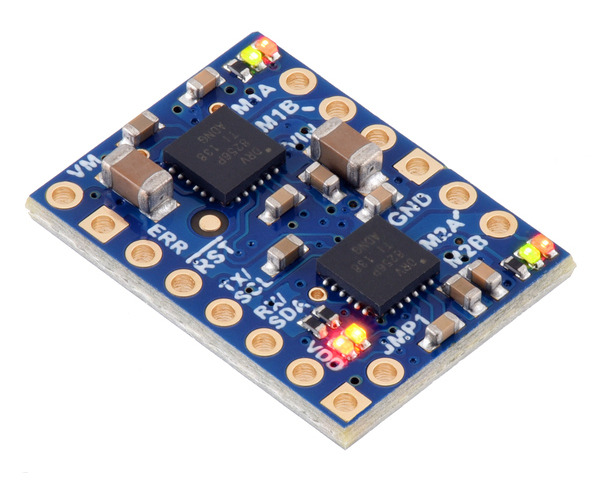

This is a merged information page for Item #5065.
View normal product page.
Pololu item #:
5065
Brand:
Pololu
Status:
Active and Preferred

The Motoron M2T256 Dual I²C Motor Controller offers a compact solution for controlling two DC motors using an I²C interface. Multiple Motoron controllers can be connected to the same I²C bus, making it easy to expand a system with additional motors. The M2T256 supports motor supply voltages from 4.5 V to 48 V and can deliver continuous output currents up to 1.8 A per motor. This version ships with header pins included but not soldered in.
Alternatives available with variations in these parameter(s): control interface header pins soldered? Select variant…
 Compare all products in Motoron M2x256 Dual Motor Controllers.
Compare all products in Motoron M2x256 Dual Motor Controllers.
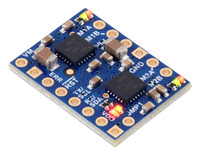 |
Motoron M2T256/M2U256 Dual Motor Controller. |
|---|
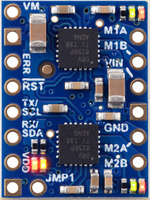 |
Motoron M2T256/M2U256 Dual Motor Controller, top view. |
|---|
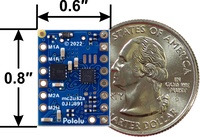 |
Motoron M2T256 Dual I²C Motor Controller, bottom view with dimensions. |
|---|
 |
Motoron M2T256/M2U256 Dual Motor Controller with included headers. |
|---|
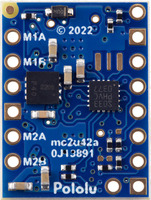 |
Motoron M2T256 Dual I²C Motor Controller, bottom view. |
|---|
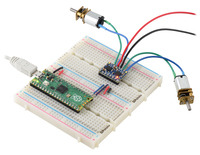 |
A Raspberry Pi Pico on a breadboard using a Motoron M2T256/M2U256 Dual Motor Controller to control two motors. |
|---|
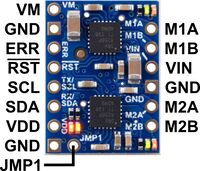 |
Motoron M2T256 Dual I²C Motor Controller pinout. |
|---|
 |
Typical wiring diagram for connecting a microcontroller to a Motoron M2T256/M2T550 Dual I²C Motor Controller. |
|---|
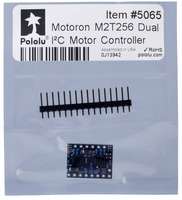 |
Standard packaging for the Motoron M2T256 Dual I²C Motor Controller. |
|---|
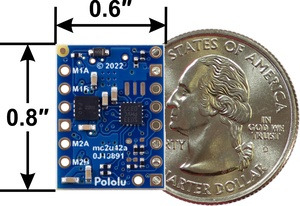 |
The Motoron M2T256 and M2U256 controllers make it easy to control two bidirectional, brushed DC motors using an I²C or TTL serial (UART) interface, respectively. These compact (0.6″ × 0.8″) boards support motor supply voltages from 4.5 V to 48 V and can deliver continuous output currents up to 1.8 A per motor. Multiple Motoron controllers can be configured to work on a single I²C or serial bus, allowing independent control of many motors. Unlike most of our motor drivers, the Motoron does not require any PWM outputs or timers on your microcontroller. Instead, only a single I²C or UART interface is needed regardless of how many Motorons you connect.
These Motoron controllers are available in several versions with different combinations of communication interfaces and connector options:
For smaller single-channel alternatives, consider the Motoron M1T256 and M1U256.
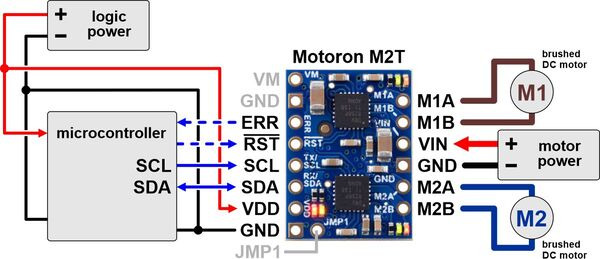 |
Typical wiring diagram for connecting a microcontroller to a Motoron M2T256/M2T550 Dual I²C Motor Controller. |
|---|
The M2T256 has an I²C interface, and this version ships with a 1×16 breakaway male header included but not soldered in.
|
|
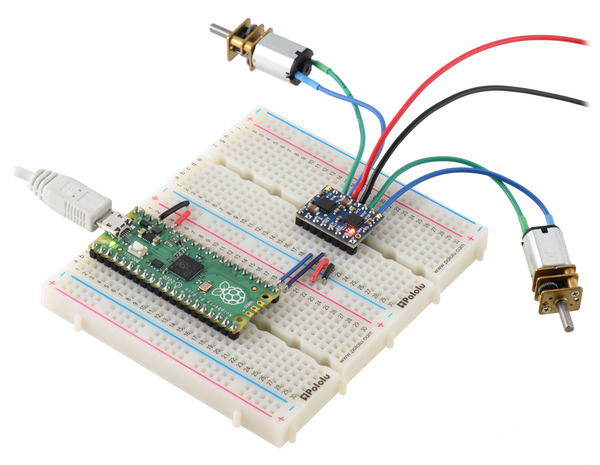 |
A Raspberry Pi Pico on a breadboard using a Motoron M2T256/M2U256 Dual Motor Controller to control two motors. |
|---|
The tables below list the members of the Motoron family and show the key differences among them. Each type is available in several versions to provide different options for the through-hole connectors: they can be purchased as an assembled product with connectors soldered in, as a kit with connectors included but not soldered in, or (for Arduino and Raspberry Pi expansions) as a standalone board without connectors.
| Motoron motor controllers micro versions |
||||
 M1T550  M1U550 |
 M2T550  M2U550 |
 M1T256  M1U256 |
 M2T256  M2U256 |
|
|---|---|---|---|---|
| Control interface: | I²C or UART serial | |||
| Motor channels: | 1 (single) | 2 (dual) | 1 (single) | 2 (dual) |
| Minimum motor supply voltage: |
1.8 V | 4.5 V | ||
| Absolute max motor supply voltage: |
22 V | 48 V | ||
| Recommended max nominal battery voltage: |
16 V | 36 V | ||
| Max continuous current per channel: |
1.8 A | 1.6 A | 2.2 A | 1.8 A |
| Logic voltage range: | 3.0 V to 4.9 V(1) | 3.0 V to 5.5 V | ||
| Current sensing/limiting: | – | – | – | – |
| Available versions with I²C: |
||||
| Available verions with UART serial: |
||||
| Price: | $14.24 – $16.19 | $18.67 – $20.69 | $19.71 – $21.72 | $28.72 – $30.73 |
| 1 The M1x550 and M2x550 are not recommended for use with 5V nominal logic. | ||||
| Motoron motor controllers Arduino and Raspberry Pi form factor versions |
||||||
 M3S550  M3H550 |
 M3S256  M3H256 |
 M2S24v14  M2H24v14 |
 M2S24v16  M2H24v16 |
 M2S18v18  M2H18v18 |
 M2S18v20  M2H18v20 |
|
|---|---|---|---|---|---|---|
| Control interface: | I²C | |||||
| Motor channels: | 3 (triple) | 2 (dual) | ||||
| Minimum motor supply voltage: |
1.8 V | 4.5 V | 6.5 V | |||
| Absolute max motor supply voltage: |
22 V | 48 V | 40 V | 30 V | ||
| Recommended max nominal battery voltage: |
16 V | 36 V | 28 V | 18 V | ||
| Max continuous current per channel: |
1.7 A | 2 A | 14 A | 16 A | 18 A | 20 A |
| Logic voltage range: | M3S550 3.1 V to 5.5 V |
3.0 V to 5.5 V | 3.0 V to 5.5 V | |||
| M3H550 3.0 V to 4.9 V(1) |
||||||
| Current sensing/limiting: | – | – | ||||
| Available versions for Arduino: |
M3S550 | M3S256 | M2S24v14 | M2S24v16 | M2S18v18 | M2S18v20 |
| Available versions for Raspberry Pi: |
M3H550 | M3H256 | M2H24v14 | M2H24v16 | M2H18v18 | M2H18v20 |
| Price: | $25.26 – $36.14 | $42.01 – $52.94 | $71.67 – $83.56 | $96.51 – $108.41 | $71.67 – $83.56 | $109.91 – $120.39 |
| 1 The M3H550 is not recommended for use with 5V nominal logic. | ||||||
| Size: | 0.6″ × 0.8″ |
|---|---|
| Weight: | 1.5 g1 |
| Channels: | 2 |
|---|---|
| Model: | Motoron M2T256 |
| Control interface: | I²C |
| Minimum operating voltage: | 4.5 V |
| Maximum operating voltage: | 48 V2 |
| Continuous output current per channel: | 1.8 A |
| Peak output current per channel: | 6.4 A |
| Minimum logic voltage: | 3.0 V |
| Maximum logic voltage: | 5.5 V |
| Reverse voltage protection?: | Y3 |
| Connectors soldered?: | N |
| PCB dev codes: | mc2u42a |
|---|---|
| Other PCB markings: | 0J13891 |
User’s manual for the Pololu Motoron Motor Controllers.
This DXF drawing shows the locations of all of the board’s holes.
No FAQs available.
The Motoron family keeps growing! We’re happy to announce the release of the Motoron M2T256 Dual I²C Motor Controller and the Motoron M2U256 Dual...